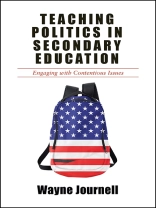Winner of the 2018 Exemplary Research in Social Studies Award presented by the National Council for the Social Studies
Many social studies teachers report feeling apprehensive about discussing potentially volatile topics in the classroom, because they fear that administrators and parents might accuse them of attempting to indoctrinate their students. Wayne Journell tackles the controversial nature of teaching politics, addressing commonly raised concerns such as how to frame divisive political issues, whether teachers should disclose their personal political beliefs to students, and how to handle political topics that become intertwined with socially sensitive topics such as race, gender, and religion. Journell discusses how classrooms can become spaces for tolerant political discourse in an increasingly politically polarized American society. In order to explore this, Journell analyzes data that include studies of high school civics/government teachers during the 2008 and 2012 presidential elections and how they integrated television programs, technology, and social media into their teaching. The book also includes a three-year study of preservice middle and secondary social studies teachers’ political knowledge and a content analysis of
CNN Student News.
Table of Content
List of Tables
List of Figures
Acknowledgments
Introduction
1. Creating Space for Political Instruction
2. Making Politics Engaging for Students
3. Teaching Presidential Elections
4. Teaching Students to Think Politically
5. Addressing Political Controversy in the Classroom
6. The Intersection of Politics and the Taboo Topics of Race, Gender, and Religion
7. Creating Politically Tolerant Classrooms and Schools
Conclusion Politics Moving Forward
Methodological Appendix
Notes
References
About the Author
Index
About the author
Wayne Journell is Associate Professor of Secondary Social Studies Education at the University of North Carolina at Greensboro and the editor of
Teaching Social Studies in an Era of Divisiveness: The Challenges of Discussing Social Issues in a Non-Partisan Way.












